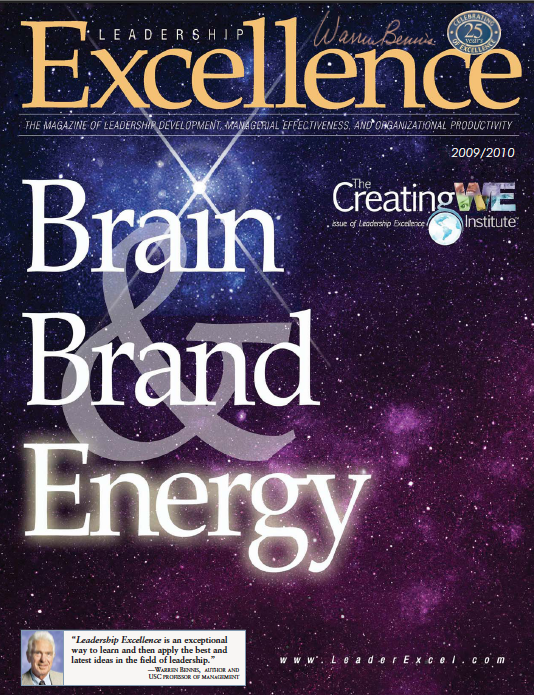By Judith E. Glaser and Charles Jones | Leadership Excellence
Published March 2008
You can create a needs-intelligent workplace.
Remember when employees were content to get a paycheck, a promise of lifelong employment, and “employee of the month” kudos in exchange for doing a good job?
Well, those days are gone! In today’s knowledge-worker-centric workplace, employees expect to work for a company they feel proud of, be involved in work that makes full use of their gifts and talents, have a say in the decisions that shape their job, enjoy opportunities to learn and grow, be respected for their expertise, and be appreciated for their contributions.
Like customers, employees have become more demanding. They expect their psychological needs to be met. Fail to meet their need of appreciation, and employees will check out from the community, as evidenced by diminishing discretionary effort, withholding opinions and ideas, and forming groups that whine and complain.
When an employee begins to check out, managers often begin to think of this person as uncooperative or unreasonable, which leads to counter-productive behaviors on part of the manager—such as avoiding the person, talking judgmentally about them, or passing them over to HR for repair.
This creates a vicious cycle: employee engagement continues to decline while the manager becomes exasperated with the employee’s performance until the tension is relieved—either by the boss deciding to fire the employee, the employee choosing to leave, or both resigning themselves to low satisfaction and performance.
We suggest interpreting negative behaviors as indications that the psychological needs that drive performance are not being met. All people have deep-seated needs for meaning, purpose, connection, and inclusion that they want—and expect—to fulfill at work. Yet leaders tend to be uncomfortable with the topic of “needs.” Needs connote a deficit, and, the word needs is often confused with the word needy, connoting excessive wants and needs. Leaders who don’t know how to have conversations about needs, often think that meeting needs means: “It will take too much of my time to meet your need—time that could be invested in getting business results.
 In this context, an employee’s need for inclusion, appreciation, or meaning shows up as an interruption or impediment to achieving goals, and the idea of supporting employees in meeting their psychological needs shows up as pandering to weakness and engendering co-dependency. And yet, employees whose bosses fail to attend to their psychological needs tend to leave or disengage, while employees whose bosses encourage them to openly express their needs and support them in finding ways to meet those needs tend to be loyal and productive.
In this context, an employee’s need for inclusion, appreciation, or meaning shows up as an interruption or impediment to achieving goals, and the idea of supporting employees in meeting their psychological needs shows up as pandering to weakness and engendering co-dependency. And yet, employees whose bosses fail to attend to their psychological needs tend to leave or disengage, while employees whose bosses encourage them to openly express their needs and support them in finding ways to meet those needs tend to be loyal and productive.
How do you create a culture where people express their psychological needs and are supported in finding ways to meet them without falling into a bottomless pit of emotionalism and psychological dependency? And, how do you leverage your employee’s psychological needs to fuel the growth and performance of your business?
Take Five Steps
We define “needs-intelligence” as the capacity to recognize the psychological needs of self and others and then to translate this awareness into actions that meet these needs. In a needs-intelligent workplace, people are encouraged to honor their own psychological needs and feel supported in finding ways to meet these needs. Creating a needs-intelligent culture will pay big dividends in higher morale, retention and productivity. Here are five steps you can take now:
1. Acknowledge the importance of people’s psychological needs. Our needs are our energy, our source of motivation and engagement. Acknowledging psychological needs in yourself and others creates a culture where people feel comfortable expressing their needs and taking action to meet them. To acknowledge needs, you must first recognize them. We have identified seven needs which, when met, lead to high engagement and satisfaction and when not met, lead to low productivity and retention: 1) inclusion and belonging: we need to feel included and connected and in a healthy supportive relationship with others and be included in the flow of information and decisions that affect our job; 2) appreciation and recognition: we need to be appreciated for our gifts, talents, and achievements and to feel comfortable recognizing and appreciating others; 3) challenge and achievement: we need to feel challenged by our work and have opportunities for achievement; 4) trust and accountability: we need to feel that we can count on others to be fair and honest, know what is expected of us, and be held accountable for our results; 5) growth and learning: we need to work in places where we can learn, grow and develop our skills and talents and contribute to our organization’s goals; 6) power and control: we need to have influence, and have a say in the results and actions we are accountable for; and 7) meaning and purpose: we need to know that our work adds value, has meaning, and is part of something bigger than we are alone.
2. Model self-responsibility for meeting needs. As a leader, you can foster a culture of self-responsibility by expressing direct and timely feedback to others when their behavior detracts from your needs being met and by making clear requests regarding actions you’d like them to take to better meet your needs. Also, you can encourage others to take more responsibility for meeting their needs by asking them for feedback on whether your behavior is meeting their needs and, if not, what needs are not being met and what actions they’d like you to take to better meet these needs.
3. Offer and accept support for identifying and meeting your needs.We often need help identifying what our needs are and the support of others to meet them. As a leader, you can foster an environment in which people support each other in identifying and meeting their needs by offering support (asking someone who appears distressed to say what’s up for him or her) and accepting support when it is offered.
4. Celebrate when needs are met. Nothing validates the importance of needs and builds momentum for continuing to meet these needs than celebrating the actions that lead to these needs being met. Celebrate the meeting of a need, and you can expect this need to become increasingly met going forward; fail to celebrate the meeting of a need that is near and dear to someone’s heart, and you can expect this person to become demoralized.
5. Hire needs-intelligent employees. People’s capacity to identify and meet their psychological needs is largely a function of their experience and upbringing. Some employees may arrive to work intent on creating a sense of inclusion and belonging, while others may arrive resigned that they’ll never feel included. As a leader, you should identify those needs you would like more support for in your culture and then hire people who have a strong connection to these needs and embody a sense of self-responsibility for ensuring that these needs are met.
Reap the Benefits
You can’t ask people to leave their needs at the door while expecting them to passionately engage in their work. You can either deal with people’s needs directly, respectfully, and effectively in support of their performing at their best, or ignore (or discount) their needs and deal with negative behavior and disengagement.
As managers and leaders, we are in a unique position to model what it means to be responsible for meeting our own needs while acknowledging that our psychological fulfillment is interdependent with others. When we create an environment in which people’s needs are acknowledged and supported, people feel comfortable expressing their thoughts, needs, and ideas, and become emotionally connected to the organization and to each other. Emotional connection is the strongest link to sustaining long-term relationships and shared commitments to success, and one of the biggest contributors to performance and retention.
The more people’s psychological needs are met, the more passionate they become about meeting the needs of their customers.




